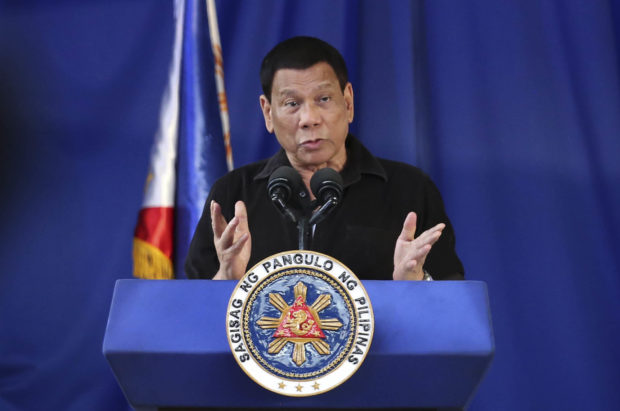Duterte admits his executive order on ‘endo’ has no bite
MULANAY, Quezon — President Duterte on Wednesday admitted that the executive order that he signed on Labor Day prohibiting certain labor contracting schemes had “no teeth.”
“So my executive order was just veering toward ending it (‘endo,’ or end of contract). I am prohibiting it but I did not put penal sanctions,” Mr. Duterte said here during the distribution of certificates of land ownership award to agrarian reform beneficiaries.
Endo refers to a contractualization scheme that offers short-term and unprotected temporary work arrangements. The scheme doesn’t give workers security of tenure.
While prohibiting endo, Executive Order No. 51 allows seasonal or project-based jobs such as those for janitors and maintenance workers.
President Duterte said penalizing violators of the order could put him in trouble. “You know, you’re asking me to violate the law. What if I get impeached? Who would give me work?” he said.
Article continues after this advertisementHe said he could do only so much. “Beyond that I am inutile,” he said.
Article continues after this advertisement‘Taken for a ride’
Labor groups were unhappy with President Duterte’s EO, saying they were “taken for a ride.” They said the order did little to limit labor contracting.
They also said that the EO merely reiterated the current regulatory policy that failed to prevent the spread of contractualization.
In his speech in Cebu City on Labor Day, the President called on Congress to amend the Labor Code for more substantive changes.
In Mulanay, the President said he did not have the power vested in Congress to impose penal sanctions on those violating the EO.
President Duterte said if there was one thing that he was prohibited from doing, it was giving the order the force of law. “I can only implement what Congress passes as laws,” he said.
Presidential spokesperson Harry Roque on Thursday scored labor groups critical of EO 51, stressing that the prohibition on contractualization may only be expanded through legislation.
If the directive signed by the President lacks teeth, critics should say so to Congress, he said.
Direct employer
Roque said on Wednesday that under EO 51, the direct employer would be considered the employer of workers.
Roque was referring to Section 3 of EO 51 in which “the principal engaged in any arrangement in violation of the order shall be considered the direct employer of the contractor’s or subcontractor’s workers for all purposes.”
The order applies to all parties, including cooperatives engaged in any contracting or subcontracting arrangement.
“Contracting or subcontracting, when undertaken to circumvent the worker’s right to security of tenure, self-organization and collective bargaining, and peaceful concerted activities pursuant to the 1987 Constitution, is hereby strictly prohibited,” the order said.
According to EO 51, it is the labor secretary, “by appropriate issuances and in consultation with labor and management, who will identify activities that may be contracted out. — WITH REPORTS FROM CHRISTINE O. AVENDAÑO AND JULIE M. AURELIO
